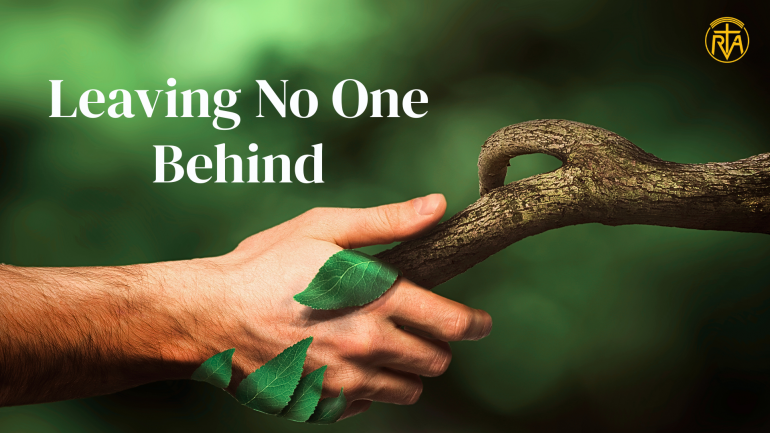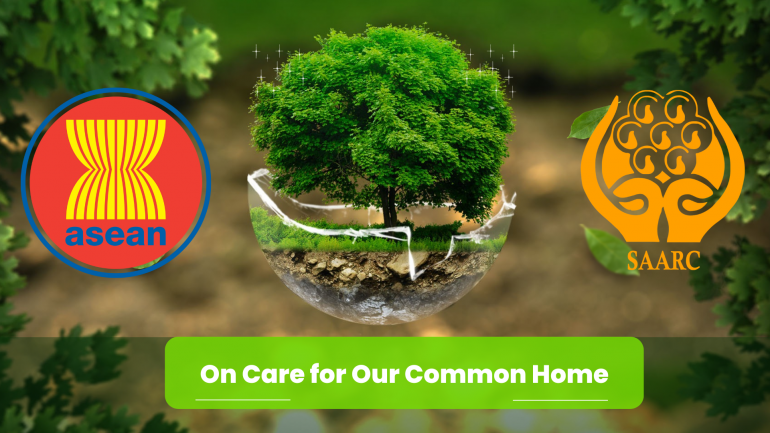Leaving No One Behind

Asia, a land of breathtaking beauty and profound diversity, is home to more than half of the world’s people. From the rice fields of Vietnam and the mountains of Nepal to the megacities of Manila, Jakarta, and Mumbai, life here is rich and vibrant. Yet, beneath this growth and progress, our continent faces serious ecological challenges: polluted rivers, disappearing forests, suffocating air, and rising seas.
The question before us is clear: Can Asia continue to grow without destroying the very home that sustains it?
In 2015, Pope Francis, through his encyclical Laudato Si’: On Care for Our Common Home, reminded humanity that the ecological crisis is also a moral and spiritual one. He calls for a new way of seeing the world, an “integral ecology”, where care for creation and care for people are inseparable. This message finds deep echoes in the heart of Asia.
Faith, Ecology, and Asian Wisdom
Pope Francis writes, “We are not God. The earth was here before us and it has been given to us.” (Laudato Si’, 67) His words invite humility and gratitude.
This vision is not new to Asia. Our cultures and religions have long taught reverence for the earth. Hinduism’s ahimsa speaks of non-violence toward all beings. Buddhism teaches the interdependence of life. Islam calls humanity khalifah, stewards of creation. Indigenous traditions, too, see the land as sacred, a gift, not a possession.
These shared values unite us across faiths and nations. They remind us that protecting creation is not a foreign idea, it is deeply Asian, deeply human, and deeply spiritual.
Asia’s Environmental Crossroads
Across Asia, the signs of ecological distress are everywhere. The Himalayan glaciers are melting, threatening the water supply of millions. Typhoons and floods are becoming stronger, devastating lives in the Philippines, Bangladesh, and Vietnam. Air pollution chokes the cities of India, China, and Indonesia. Plastics and chemicals fill our rivers and seas, poisoning fish and food chains.
Scientists warn that if we fail to limit global warming to 1.5°C, the consequences for Asia could be catastrophic, including loss of livelihoods, displacement, and even hunger.
Yet amid this crisis, there are sparks of hope. Rural communities in India and Thailand are returning to organic farming. Young volunteers in Indonesia plant mangroves to protect coastlines. Churches and parishes across the Philippines promote tree planting and waste segregation. These local efforts may seem small, but together, they show the strength of faith and community in caring for creation.
Change of Heart
Pope Francis calls for an “ecological conversion”, a deep interior change that moves us from indifference to love, from waste to wonder. It means seeing creation not as something to use and discard but as something sacred to protect.
He warns that today’s “throwaway culture”, our addiction to convenience and consumption, is poisoning the planet and our souls. “The earth, our home,” he writes, “is beginning to look more and more like an immense pile of filth.”
But the Pope also offers hope. Every small act of care matters, turning off unnecessary lights, avoiding single-use plastics, planting a tree, or reducing waste. These are not just environmental gestures; they are acts of love and solidarity with the poor and with future generations.
In Asia, where many people still live in an austere manner and value community over materialism, this message resonates strongly. True happiness, the Pope reminds us, comes not from possessing more but from living with gratitude, moderation, and generosity.
Education is essential for this conversion. Schools, parishes, and families must teach young people to see creation as God’s gift. Faith-based and interfaith initiatives can help cultivate environmental responsibility, showing that caring for the earth is a form of prayer and service.

Shared Responsibility
Personal effort must be joined with collective action. Governments, corporations, and regional organizations all share responsibility for protecting creation.
In Laudate Deum, Pope Francis expressed frustration that the world had done too little since Laudato Si’. He reminded global leaders that climate change is not a future threat; it is happening now. He called for “a politics which is farsighted and capable of a new, integral, and interdisciplinary approach.”
Asia must rise to this challenge. Regional cooperation through ASEAN, SAARC, and other platforms can help nations share technology, knowledge, and climate strategies. Policies should prioritize renewable energy, clean water, sustainable cities, and the protection of forests and oceans.
Corporations, too, must act responsibly. Profit should never come at the cost of people and the planet. Ethical business practices, fair trade, and green innovation can drive growth that is both just and sustainable.
Youth and Intergenerational Justice
Asia’s young people are leading the way. From school strikes to beach clean-ups, they are raising their voices for the planet’s future. Movements like Fridays for Future show that youth are not just followers, they are leaders in the fight for climate justice.
Pope Francis calls this “intergenerational solidarity”, the moral duty to safeguard the world we will hand over to our children. Supporting youth initiatives and listening to their concerns can bring new energy and creativity to Asia’s environmental movement.
Hope for a Shared Home
The road toward a sustainable Asia is long, but not impossible.
We are being called to build a Neo-Humanistic Society, one that values human dignity, compassion, and harmony with creation. Caring for our planet is not only an environmental issue; it is a moral and spiritual duty that unites all faiths and peoples.
As Pope Francis reminds us: “Humanity still has the ability to work together in building our common home.”
May we, as one Asian family, answer this call with faith, courage, and love, ensuring that in our journey toward a better future, truly, no one is left behind.
Let us know how you feel!
Comments
Thank you for such a timely and inspiring message — it enlightens the mind, moves the heart, and rekindles our resolve to protect creation with faith, courage, and love.










- Reply
Permalink